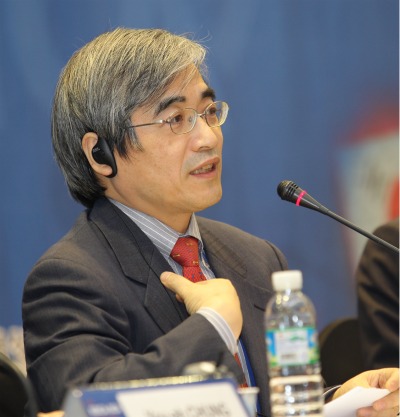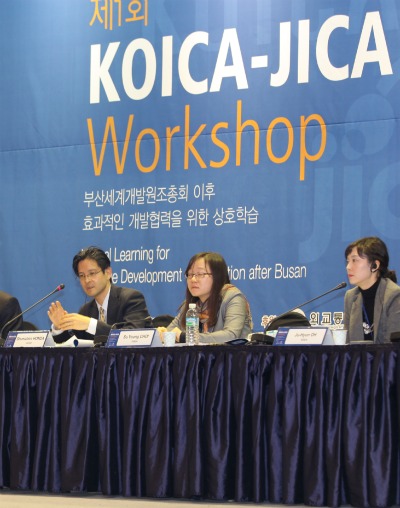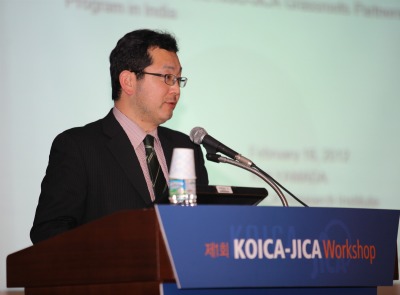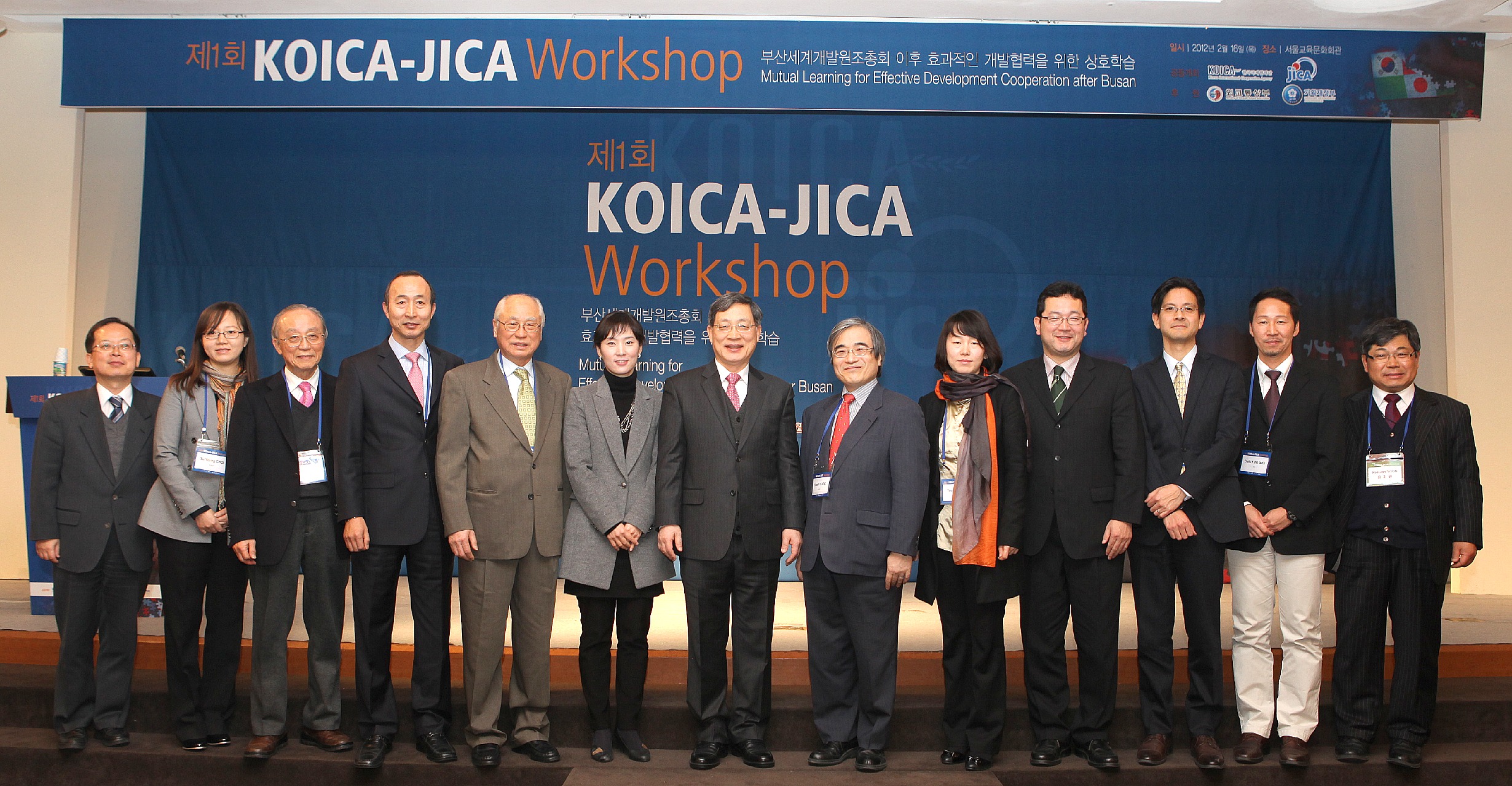JICA and KOICA's Joint Workshop: An Opportunity of Mutual Learning for Delivering Impact in Development Cooperation
2012.03.02
JICA and its Korean counterpart Korea International Cooperation Agency (KOICA) have been closely collaborating in various ways such as joint training programs and research projects (one of which led to the publication of a book Catalyzing Development from Brookings Institution Press in 2011). In furthering this partnership, two agencies held an all-day workshop titled “Mutual Learning for Effective Development Cooperation after Busan” in Seoul on February 16, 2012, and over 100 people, including practitioners involved in ODA work, academics and college students turned out to join the event. This workshop, the first of its kind ever, was to provide an occasion for both to examine latest topics on development and learn from each other. KOICA’s Vice President Sungmog Hong, Director of ODA Research Office You-ah Chung and other officials were among those who attended. From Japan, JICA-RI’s Deputy Director Hiroshi Kato, Senior Advisor to Deputy Director Koji Yamada and Research Associate Shunichiro Honda as well as JICA’s Daiki Kunitake (deputy director of Development Partnership Division) participated.

Deputy Director Hiroshi Kato
Out of diverse topics, the workshop focused on three agendas: research and practice linkage, public-private partnership (PPP), and programme based approaches (PBAs, for short, is a concept that places emphasis on coordinated support for recipient-country-led national development programs among donors and other actors), and speakers from JICA and KOICA each made a presentation on these issues. PPP and PBAs were selected through the consultation between the two agencies from the key aid effectiveness themes discussed at the Busan High-Level Forum on Aid Effectiveness last December.
In the first session titled “Bridging Knowledge and Practice Together,” Deputy Director Kato described the history of JICA-RI and its operation as an institution to pursue objective research on the issues regarding international development and Japan’s ODA and to internationally disseminate its outcomes. He further elaborated on how JICA-RI leads collaborative studies among academic researchers and development practioners in hope of creating synergy between research and practice. In a country where think-tanks specializing in development do not exist, JICA-RI plays a role in promoting development studies based on hands-on experience and cultivating experts in this field, Kato stressed.
JICA’s Kunitake illustrated the background of aid effectiveness discussions and aid coordination in practice from Japan’s perspective in the following session. He showed that JICA had rich experience in South-South and triangular cooperation and had greatly contributed to the debate on this agenda in Busan. He also highlighted JICA’s stance on aid coordination in addition to speaking of its patterns seen on the ground. He concluded his presentation by emphasizing the important aspect of PBAs that is conducive to advancing development effectiveness as it will draw more attention as a driving force for paradigm shift in development trends.

Research Associate Shunichiro Honda (left)
Next, Research Associate Honda shared his knowledge and experience regarding PBAs in Tanzania. This development cooperation concept, as mentioned above, stands on the principles of coordinated support of different development actors for a recipient-country-centered development strategies and programs. They are now globally considered as one of the major approaches to improve aid effectiveness. Honda explained the cases of JICA’s various engagement in PBAs in Tanzania since the early 2000s – which was one of the earliest active PBAs involvements in Japan’s ODA. By reflecting these cases, he pointed out some of the PBAs’ advantages such as improvement of policy and strategy framework and better coordination in support for tackling difficult systemic reform agendas. For JICA, the aggressive participation in PBAs provided the opportunities to scale-up good practices developed through the collaboration with Tanzania, he mentioned.

Senior Advisor to the Deputy Director Koji Yamada
The third session covered PPP and Yamada from JICA-RI spoke of JICA’s private sector partnership programs in India which he supervised during his service as the senior representative of JICA India office. After briefly introducing its PPP operation and support for NGOs and civil society organizations, he gave an account of a few cases undertaken with NGOs and private corporations respectively. In particular, Yamada discussed “haco. PEACE BY PEACE Cotton Project,” an organic cotton production support project where JICA India office acted as a mediator between India and Japanese corporations and facilitated communication among all. The ideal role of a development agency in PPP and cooperation with NGOs should be that of a catalyst that assists mutual learning and information-sharing between involved players, he argued
In the closing speech, Deputy Director Kato said the workshop had become a fruitful occasion for both to share each other’s experience (especially thanks to the hard work of KOICA research office staff), and expressed his wish to continue the mutual learning opportunities, hopefully for jointly disseminating the knowledge of the two agencies globally in the future.


事業事前評価表(地球規模課題対応国際科学技術協力(SATREPS)).国際協力機構 地球環境部 . 防災第一チーム. 1.案件名.国 名: フィリピン共和国.

事業事前評価表(地球規模課題対応国際科学技術協力(SATREPS)).国際協力機構 地球環境部 . 防災第一チーム. 1.案件名.国 名: フィリピン共和国.

事業事前評価表(地球規模課題対応国際科学技術協力(SATREPS)).国際協力機構 地球環境部 . 防災第一チーム. 1.案件名.国 名: フィリピン共和国.

事業事前評価表(地球規模課題対応国際科学技術協力(SATREPS)).国際協力機構 地球環境部 . 防災第一チーム. 1.案件名.国 名: フィリピン共和国.

事業事前評価表(地球規模課題対応国際科学技術協力(SATREPS)).国際協力機構 地球環境部 . 防災第一チーム. 1.案件名.国 名: フィリピン共和国.